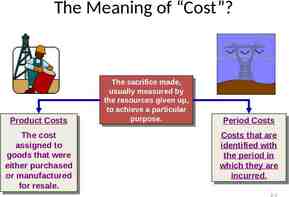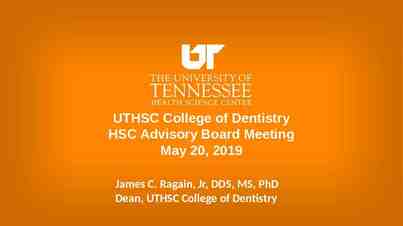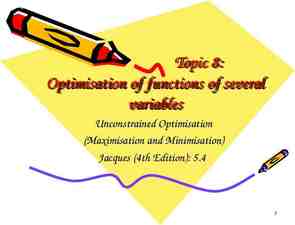2 Developing Marketing Strategies and Plans Marketing Management,
44 Slides2.63 MB

2 Developing Marketing Strategies and Plans Marketing Management, 13th ed

Chapter Questions How does marketing affect customer value? How is strategic planning carried out at different levels of the organization? What does a marketing plan include? 2-2 Copyright 2009 Pearson Education, Inc. Publishing as Prentice Hall

Siemens AG has grown through new product innovation and strategic acquisitions 2-3 Copyright 2009 Pearson Education, Inc. Publishing as Prentice Hall

Nike Creates Value 2-4 Copyright 2009 Pearson Education, Inc. Publishing as Prentice Hall

Three V’s Approach to Marketing Define Define the the value value segment segment Define Define the the value value proposition proposition Define Define the the value value network network 2-5 Copyright 2009 Pearson Education, Inc. Publishing as Prentice Hall

What is the Value Chain? The value chain is a tool for identifying ways to create more customer value because every firm is a synthesis of primary and support activities performed to design, produce, market, deliver, and support its product. 2-6 Copyright 2009 Pearson Education, Inc. Publishing as Prentice Hall

Cisco Systems Taps into Partner Expertise to Create Value 2-7 Copyright 2009 Pearson Education, Inc. Publishing as Prentice Hall

Core Business Processes Market-sensing process New-offering realization process Customer acquisition process Customer relationship management process Fulfillment management process 2-8 Copyright 2009 Pearson Education, Inc. Publishing as Prentice Hall

Characteristics of Core Competencies A source of competitive advantage Applications in a wide variety of markets Difficult to imitate 2-9 Copyright 2009 Pearson Education, Inc. Publishing as Prentice Hall

Netflix’s Distinctive Capabilities 2-10 Copyright 2009 Pearson Education, Inc. Publishing as Prentice Hall

Firms Should Consider Key Questions Can we learn from the past? How should the present be evaluated? What do we envision for the future? 2-11 Copyright 2009 Pearson Education, Inc. Publishing as Prentice Hall

What is Holistic Marketing? Holistic marketing sees itself as integrating the value exploration, value creation, and value delivery activities with the purpose of building long-term, mutually satisfying relationships and coprosperity among key stakeholders. 2-12 Copyright 2009 Pearson Education, Inc. Publishing as Prentice Hall

Intel’s New Brand Identity: Leap Ahead 2-13 Copyright 2009 Pearson Education, Inc. Publishing as Prentice Hall

What is a Marketing Plan? A marketing plan is the central instrument for directing and coordinating the marketing effort. It operates at a strategic and tactical level. 2-14 Copyright 2009 Pearson Education, Inc. Publishing as Prentice Hall

Levels of a Marketing Plan Strategic Tactical Target marketing decisions Value proposition Analysis of marketing opportunities 2-15 Product features Promotion Merchandising Pricing Sales channels Service Copyright 2009 Pearson Education, Inc. Publishing as Prentice Hall

Figure 2.2 The Strategic Planning, Implementation, and Control Processes 2-16 Copyright 2009 Pearson Education, Inc. Publishing as Prentice Hall

Corporate Headquarters’ Planning Activities Define the corporate mission Establish strategic business units (SBUs) Assign resources to each SBU Assess growth opportunities 2-17 Copyright 2009 Pearson Education, Inc. Publishing as Prentice Hall

Good Mission Statements Focus Focus on on limited limited number number of of goals goals Stress Stress major major policies policies and and values values Define Define major major competitive competitive spheres spheres Take Take aa long-term long-term view view Short, Short, memorable, memorable, meaningful meaningful 2-18 Copyright 2009 Pearson Education, Inc. Publishing as Prentice Hall

Major Competitive Spheres Industry Geographical Products Vertical channels Competence Market segment 2-19 Copyright 2009 Pearson Education, Inc. Publishing as Prentice Hall

Rubbermaid Commercial Products, Inc. “Our vision is to be the Global Market Share Leader in each of the markets we serve. We will earn this leadership position by providing to our distributor and end-user customers innovative, high-quality, costeffective and environmentally responsible products. We will add value to these products by providing legendary customer service through our uncompromising Commitment to Customer Satisfaction.” 2-20 Copyright 2009 Pearson Education, Inc. Publishing as Prentice Hall

Motorola “The purpose of Motorola is to honorably serve the needs of the community by providing products and services of superior quality at a fair price to our customers; to do this so as to earn an adequate profit which is required for the total enterprise to grow; and by doing so, provide the opportunity for our employees and shareholders to achieve their personal objectives.” 2-21 Copyright 2009 Pearson Education, Inc. Publishing as Prentice Hall

eBay “We help people trade anything on earth. We will continue to enhance the online trading experiences of all—collectors, dealers, small businesses, unique item seekers, bargain hunters, opportunity sellers, and browsers.” 2-22 Copyright 2009 Pearson Education, Inc. Publishing as Prentice Hall

Table 2.3 Product Orientation vs. Market Orientation Company Product Market Missouri-Pacific Railroad We run a railroad We are a peopleand-goods mover Xerox We make copying equipment We improve office productivity Standard Oil We sell gasoline We supply energy Columbia Pictures We make movies We entertain people 2-23 Copyright 2009 Pearson Education, Inc. Publishing as Prentice Hall

Dimensions That Define a Business Customer groups Customer needs 2-24 Technology Copyright 2009 Pearson Education, Inc. Publishing as Prentice Hall

Characteristics of SBUs It is a single business or collection of related businesses It has its own set of competitors It has a leader responsible for strategic planning and profitability 2-25 Copyright 2009 Pearson Education, Inc. Publishing as Prentice Hall

Figure 2.3 The Strategic Planning Gap 2-26 Copyright 2009 Pearson Education, Inc. Publishing as Prentice Hall

Strategies Suggested by Ansoff’s Product-Market Expansion Grid 2-27 Market penetration Market development Product development Diversification Copyright 2009 Pearson Education, Inc. Publishing as Prentice Hall
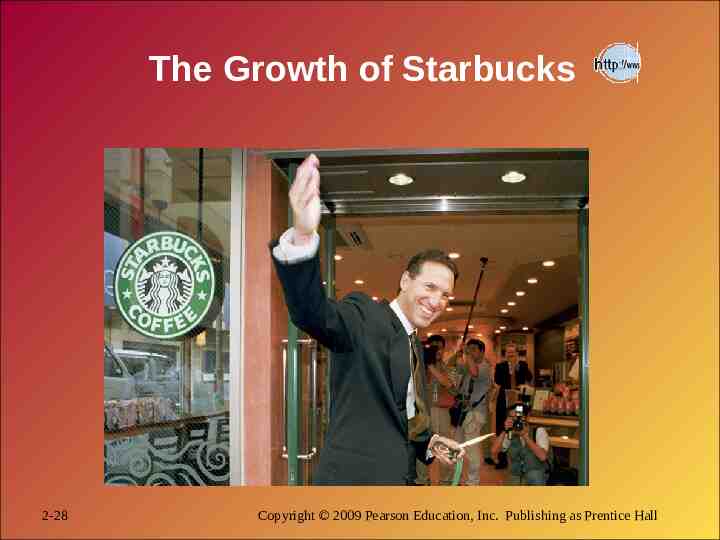
The Growth of Starbucks 2-28 Copyright 2009 Pearson Education, Inc. Publishing as Prentice Hall

What is Corporate Culture? Corporate culture is the shared experiences, stories, beliefs, and norms that characterize an organization. 2-29 Copyright 2009 Pearson Education, Inc. Publishing as Prentice Hall

Tactics for Managing Change 2-30 Avoid the innovation title for the team Use the buddy system Set the metrics in advance Aim for quick hits first Get data to back up your gut Copyright 2009 Pearson Education, Inc. Publishing as Prentice Hall
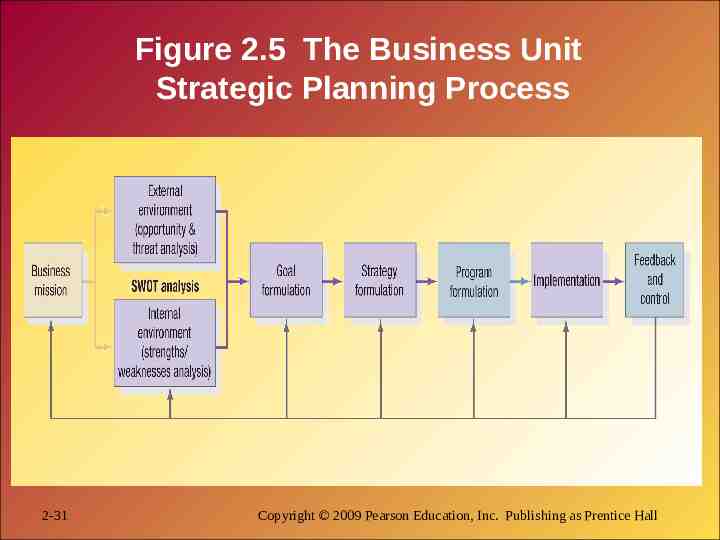
Figure 2.5 The Business Unit Strategic Planning Process 2-31 Copyright 2009 Pearson Education, Inc. Publishing as Prentice Hall
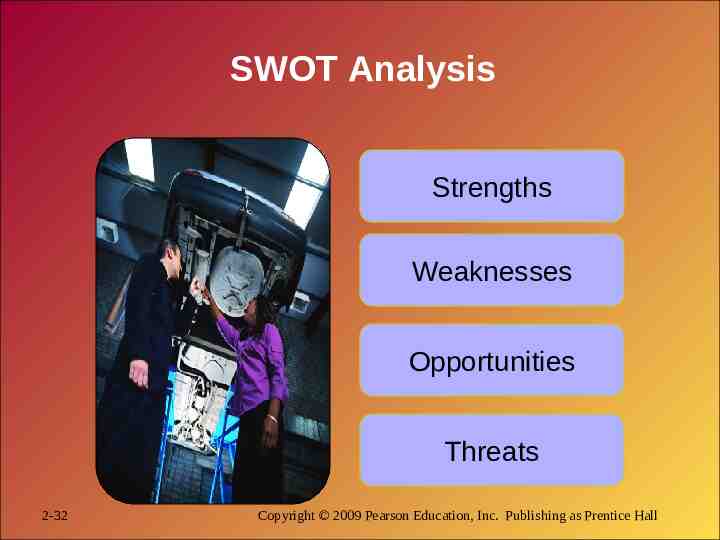
SWOT Analysis Strengths Weaknesses Opportunities Threats 2-32 Copyright 2009 Pearson Education, Inc. Publishing as Prentice Hall
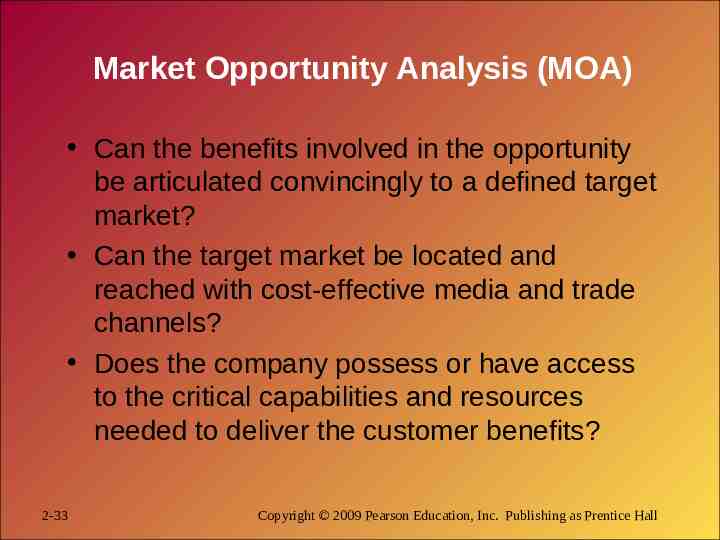
Market Opportunity Analysis (MOA) Can the benefits involved in the opportunity be articulated convincingly to a defined target market? Can the target market be located and reached with cost-effective media and trade channels? Does the company possess or have access to the critical capabilities and resources needed to deliver the customer benefits? 2-33 Copyright 2009 Pearson Education, Inc. Publishing as Prentice Hall
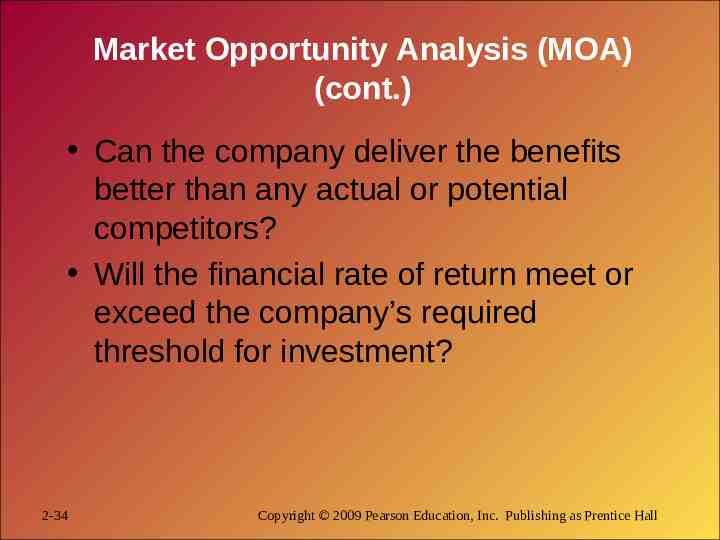
Market Opportunity Analysis (MOA) (cont.) Can the company deliver the benefits better than any actual or potential competitors? Will the financial rate of return meet or exceed the company’s required threshold for investment? 2-34 Copyright 2009 Pearson Education, Inc. Publishing as Prentice Hall

FedEx FedEx added Sunday deliveries based on customer requests and market demand 2-35 Copyright 2009 Pearson Education, Inc. Publishing as Prentice Hall
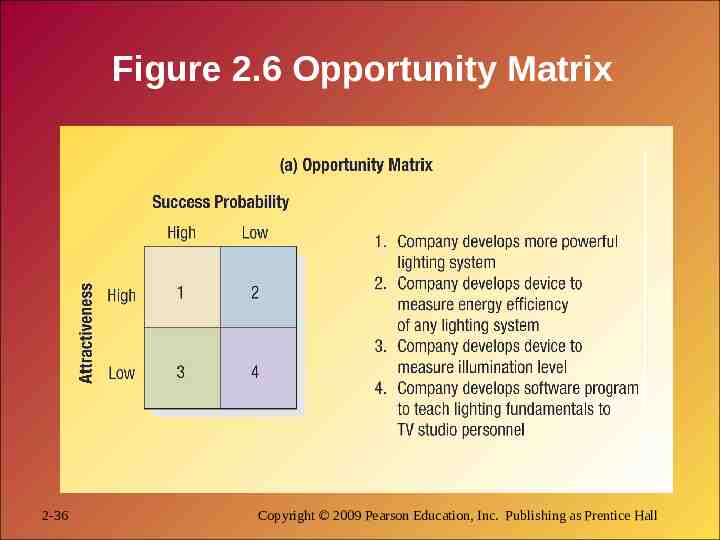
Figure 2.6 Opportunity Matrix 2-36 Copyright 2009 Pearson Education, Inc. Publishing as Prentice Hall
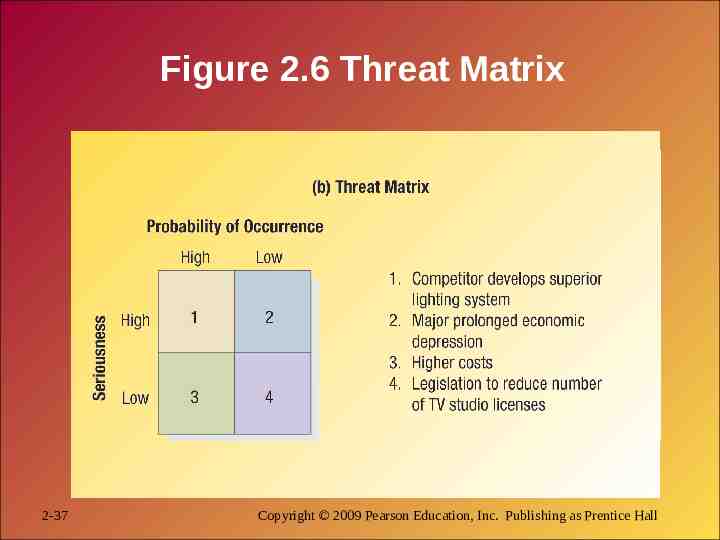
Figure 2.6 Threat Matrix 2-37 Copyright 2009 Pearson Education, Inc. Publishing as Prentice Hall
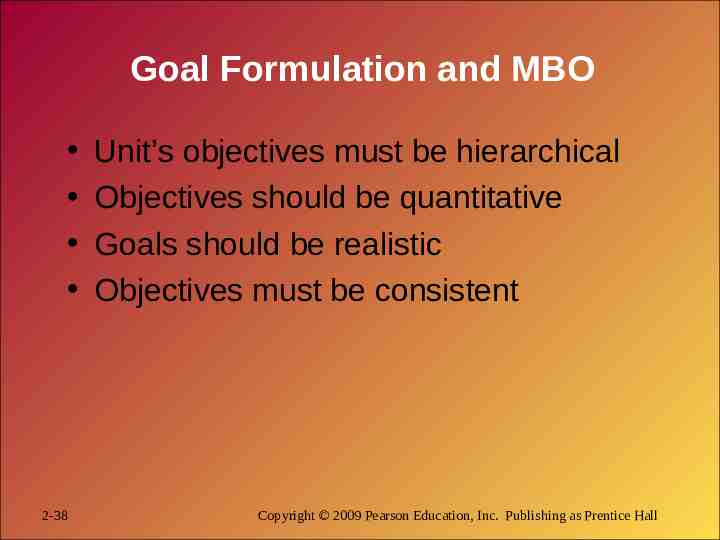
Goal Formulation and MBO 2-38 Unit’s objectives must be hierarchical Objectives should be quantitative Goals should be realistic Objectives must be consistent Copyright 2009 Pearson Education, Inc. Publishing as Prentice Hall
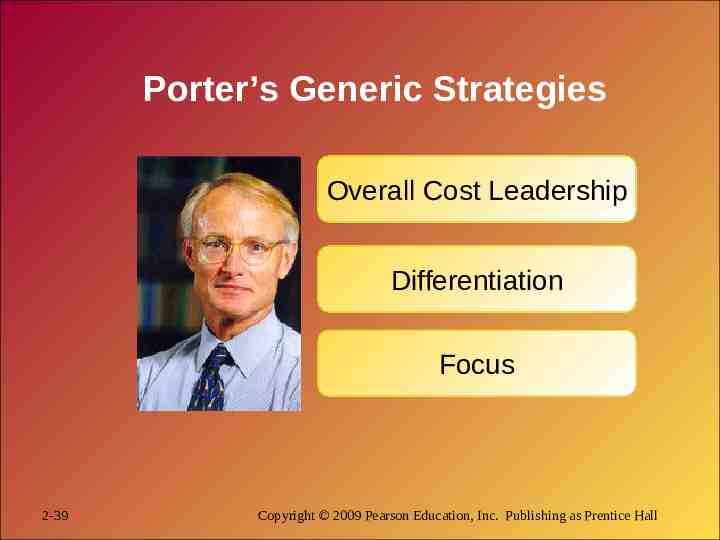
Porter’s Generic Strategies Overall Cost Leadership Differentiation Focus 2-39 Copyright 2009 Pearson Education, Inc. Publishing as Prentice Hall
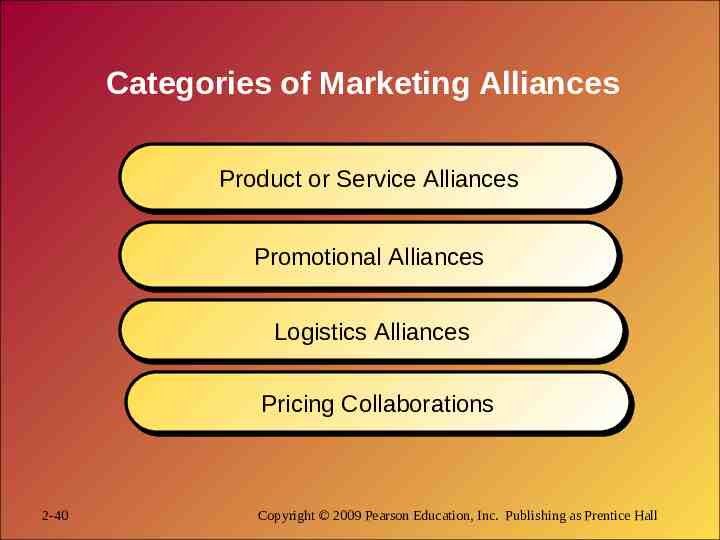
Categories of Marketing Alliances Product Product or or Service Service Alliances Alliances Promotional Promotional Alliances Alliances Logistics Logistics Alliances Alliances Pricing Pricing Collaborations Collaborations 2-40 Copyright 2009 Pearson Education, Inc. Publishing as Prentice Hall
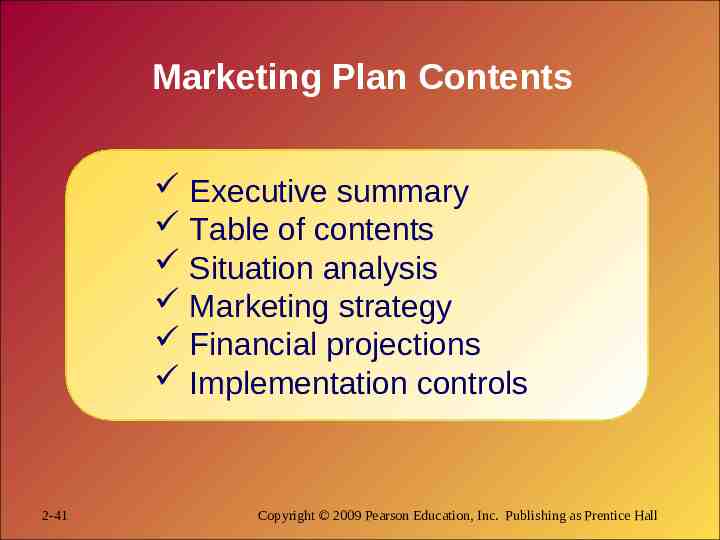
Marketing Plan Contents Executive summary Table of contents Situation analysis Marketing strategy Financial projections Implementation controls 2-41 Copyright 2009 Pearson Education, Inc. Publishing as Prentice Hall
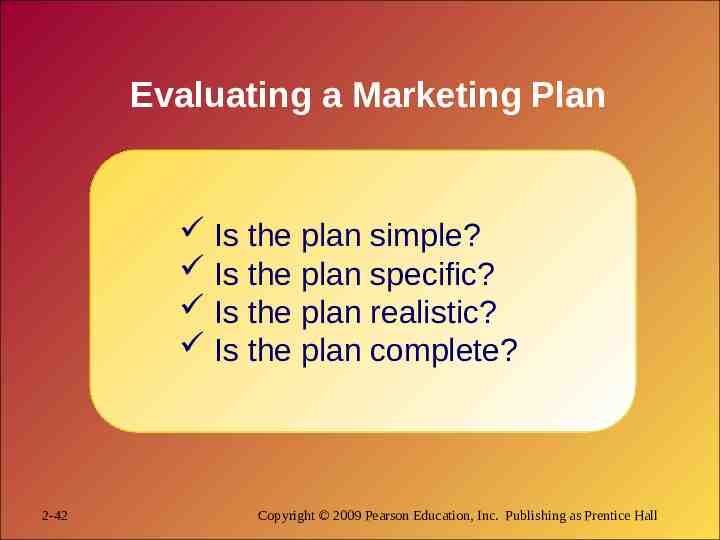
Evaluating a Marketing Plan Is the plan simple? Is the plan specific? Is the plan realistic? Is the plan complete? 2-42 Copyright 2009 Pearson Education, Inc. Publishing as Prentice Hall
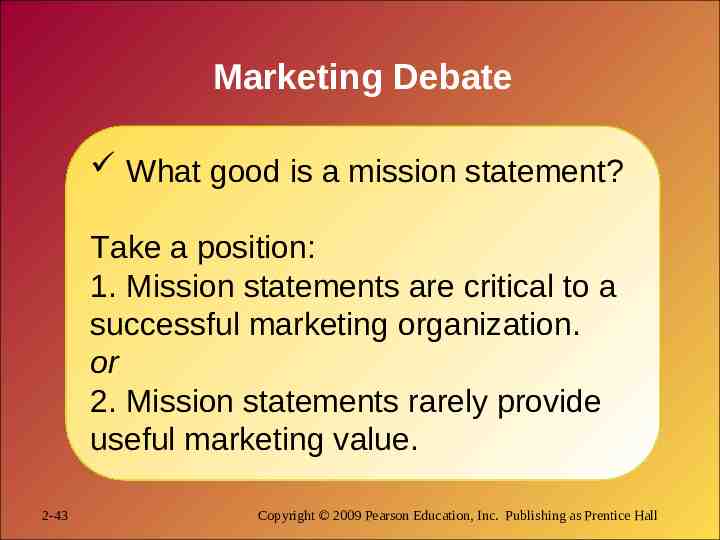
Marketing Debate What good is a mission statement? Take a position: 1. Mission statements are critical to a successful marketing organization. or 2. Mission statements rarely provide useful marketing value. 2-43 Copyright 2009 Pearson Education, Inc. Publishing as Prentice Hall
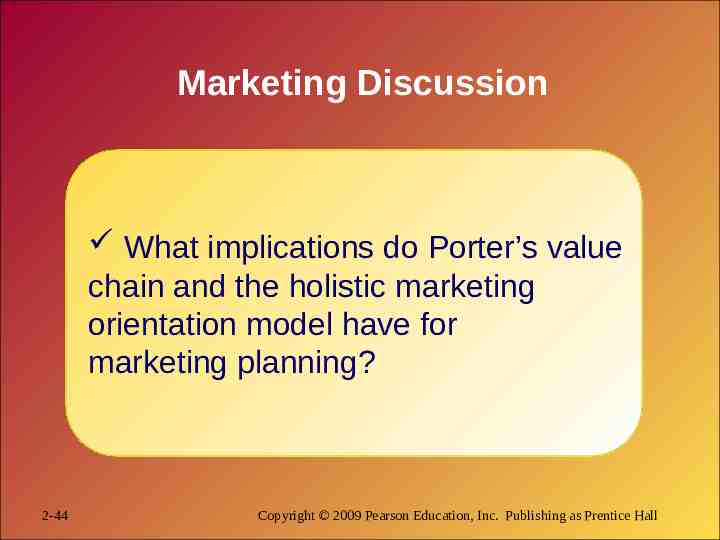
Marketing Discussion What implications do Porter’s value chain and the holistic marketing orientation model have for marketing planning? 2-44 Copyright 2009 Pearson Education, Inc. Publishing as Prentice Hall


